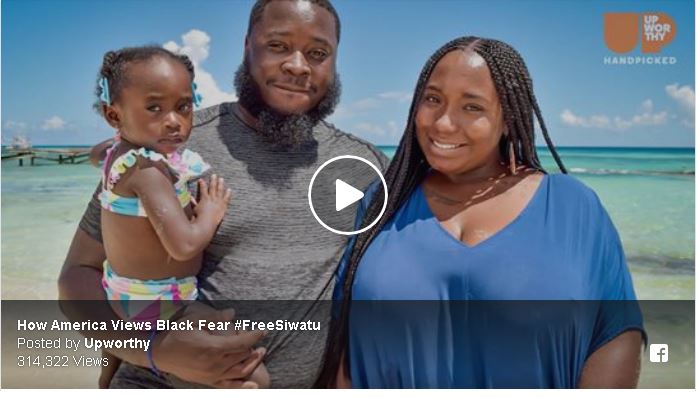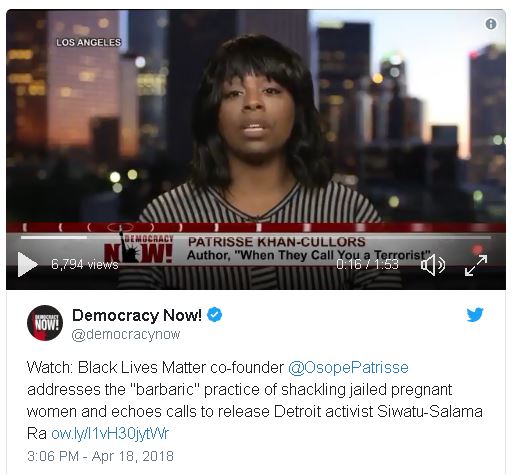|
How
does a pregnant Black woman receive a two-year sentence for defending
herself and her family with an unloaded registered handgun, against
someone who attempted to hit her with a car? Why don’t Stand
Your Ground laws protect Black people who stand their ground and act
in self-defense, and why doesn’t the NRA seem to care? Why do
the laws disproportionately punish Black people? Why are these
stories often swept under the rug?The case of Detroit environmental
activist and young Black Muslim woman Siwatu-Salama Ra raises
questions, as she serves a mandatory sentence and is set to give
birth to her second child in prison, and in shackles, after standing
her ground.
Siwatu-Salama
Ra, 26, is a community leader and activist with the East Michigan
Environmental Action Council. In July 2017, there was an altercation
at the Detroit home of Ra’s mother, in connection with a fight
between Ra’s niece and the friend of the niece a few months
earlier, as the Detroit Metro Times reported.
The friend came to Ra’s mother’s house, reportedly
leading to a dispute between Ra and Channell Harvey, the friend’s
mother, who had come to pick up her daughter.
In
a quick escalation, Harvey rammed her car into Ra’s vehicle
while the activist’s 2-year-old daughter was playing inside. As
Harvey allegedly attempted to run over Ra’s mother, Ra took her
unloaded, registered handgun from the glove compartment and
brandished the weapon, which defused the situation. Ra was a licensed
concealed gun owner. Harvey then reportedly took three photos with
her cellphone of Ra holding her handgun and went to the police to
file a report that Ra was threatening her with a gun. After Harvey,
who was on probation
for a gun charge
at the time, filed her report with the police, Ra also filed a
report. But Ra’s attorneys say that a detective testified that
Detroit Police Department policy dictates that the first
person to file a report is considered the victim — in this case
Harvey. Police and prosecutors have
denied the existence
of the policy.
The
jury, ending
their deliberations early
due to a pending snowstorm, found Ra guilty of felonious assault
against Harvey and of “felony firearm” — use of a
firearm while committing a felony — but not guilty of felonious
assault charge against Harvey’s daughter, yielding Ra a
mandatory two-year sentence. The jury was unaware of the mandatory
sentence because juries are not provided such information.

Described
by Sierra
Club
executive director Michael Brune as “a powerful and inspiring
leader in the Michigan environmental justice community,”
Siwatu-Salama Ra has made her presence known in the national and
international environmental arenas, participating in the COP21
conference in Paris, taking on polluters such as the Marathon Oil
Refinery and the Detroit Renewable Power trash incinerator when when
she was only 19, and organizing people from around the country, as
her mother Rhonda
Anderson
noted. Anderson, an organizing manager with Sierra Club in Detroit,
told Michigan Public Radio that her daughter grew up in Detroit’s
Afrocentric “activist culture community” and that
Siwatu’s name means “born during war, to bring in peace,
sent by God.” Anderson believes the stereotype of the angry
Black woman helped convict Siwatu. “I know that she was
innocent, that she was doing exactly as she said,” Anderson
said. “She was protecting me, herself, and her daughter, from a
person who was enraged, and hell-bent on hurting somebody, or
threatening to hurt somebody.” While fear was at the heart of
the case, with prosecutors
arguing Siwatu did not look
scared, her supporters note a reason why she was frightened — a
2015 road rage incident in which a white man pointed a gun at her and
daughter while driving in Macomb County, Michigan.
In
Ra’s trial, the jury was focused on why the gun was in her car,
an issue that was not part of the case.
Mandatory
sentencing — which strips judges of the discretion to sentence
defendants such as Siwatu — disproportionately affects Black
people. A University
of Michigan Law School
study found that Black defendants are 75 percent more likely to be
subjected to a mandatory sentence than white defendants who committed
the same offense.
Under
Michigan’s Stand
Your Ground law,
a person who is not committing a crime has the right to use force
against someone in self-defense, without a duty to retreat, if “he
or she honestly and reasonably believes that the use of that force is
necessary to defend himself or herself or another individual from the
imminent unlawful use of force by another individual.”
The
NRA, which has lobbied heavily for Stand Your Ground laws, has faced
criticism for its silence and inaction on Ra’s case. The gun
rights organization tweeted about Ra, and NRA
TV discussed the case:
Whether
the NRA will assist Ra, however, remains to be seen. Unlike white
people, Black people have been unable to secure their gun rights in
Stand Your Ground states. According to the Urban Institute, when
whites fatally shoot Black people, 34 percent of those killings are
found justifiable. However, only 3 percent of homicides involving
Black perpetrators and white victims are judged justifiable, while
cases involving Black shooters killing Black people are less likely
to be found justifiable than when the shooter and the decedent are
white.
With
an already complicated
history
regarding Black people, the NRA has been cited for its silence on
Marissa Alexander, a domestic violence victim who was convicted for
firing a shot to fend off her abusive husband in 2012, and whose
Stand Your Ground defense was rejected. Further, the NRA
said nothing
of the Second Amendment rights of Philando Castile, who was killed by
police in St. Anthony, Minnesota in 2016 for legally carrying a gun.
Rather the group trolled Castile’s supporters and lashed out at
them on social media. The NRA and its board members and spokespeople
have made racially offensive comments about Black people and have
made open calls to white supremacy by blaming Black Lives Matter for
racial hatred and warning the group will torture and kill white
people like Black South Africans. One NRA
recruitment ad
made open calls for violence against anti-Trump resistance movements.
The president of the Brady Campaign to Prevent Gun Violence even
called
the NRA terrorists.
Black
Lives Matter, which protests police violence against Black people,
has taken on the cause of Siwatu-Salama Ra, who is fearful
of giving birth in prison.

Black
Lives Matter co-founder Patrisse Khan-Cullors told Democracy Now!
that the shackling of Siwatu is ”disturbing and barbaric,”
adding the jailed activist will be shackled while giving birth.
“She’s been shackled several times, at doctor’s
visits, shackled so badly that she can’t feel her — her
legs go numb. This practice of shackling has been stopped in some
states, but obviously not all,” Khan-Cullors said. “And
so, yes, she will be shackled while giving birth, unfortunately. And
it’s devastating for any person who’s pregnant and giving
birth to have to go through anything but the labor, anything
extraneous outside of the labor. So, to be shackled is just
disturbing and barbaric.”
Often
in Michigan, prisoners are shacked when in labor and are not allowed
to have family or friends with them while giving birth. Typically,
the mother can only spend 24 hours with her baby, who is then removed
from her. Even prisoners with high-risk pregnancies who were allowed
medical care outside the prison were subjected to humiliating strip
searches, belly chains and handcuffs, with children’s services
informing mothers their baby could be placed in foster care. In a
recent study
of shackling policies for pregnant women throughout the country,
Michigan was unwilling to provide information on its guidelines. At
Huron Valley, the only women’s prison in Michigan, pregnant
prisoners are reportedly handcuffed during transport to the hospital
even when in active labor, and while restraints are removed in the
hospital unless there is authorization to do otherwise, there is no
state legislation mandating the practice, and apparently no regard
for the needs and
concerns of pregnant and postpartum women. Ra is reportedly receiving
inadequate medical care for her high-risk pregnancy, with her feet
shackled to the bed during vaginal exams.
Prison
is no place for a pregnant woman, noted Victoria Burton-Harris, who
is representing Ra and seeking her release while appealing the case.
“It’s hard enough to carry a child, to carry a child full
term. And Siwatu did not carry her first child to term. She had an
early pregnancy, or she had an early delivery date with her first
child. She had serious complications with that pregnancy,”
Burton-Harris told Democracy Now! “And she’s currently
showing signs and symptoms of the same complications now with the
second pregnancy. And so, we are working diligently to get her
released on an appeal bond, so that she can deliver her child safely
at home.” Siwatu’s legal
team
is also pursuing a reversal of her conviction, a commutation and
pardon.
The
Council on American-Islamic Relations of Michigan also filed a civil
rights complaint on behalf of Ra, who is imprisoned at Huron Valley
Correctional Institution, alleging the Michigan Department of
Corrections is denying her of her freedom of religious expression by
denying her pork-free meals, and not providing her with a hijab for
daily prayers. Ra, who has lost weight while in prison, does not want
to give up meat while she is pregnant.
An
online Freedom
Fund
and a #FreeSiwatu
website were established to support Ra.
This commentary was originally published by AtlantaBlackStar.com
|

